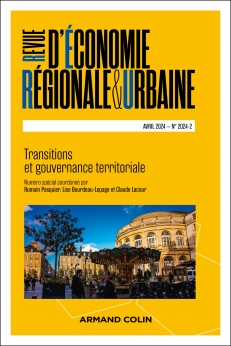
REVUE D'ÉCONOMIE RÉGIONALE ET URBAINE (2/2024)
Pour acheter ce numéro, contactez-nous
Recevez les numéros de l'année en cours et accédez à l'intégralité des articles en ligne.
Les tiers-lieux sont définis comme des espaces innovants d’expérimentation d’activités multi-parties prenantes, et se présentent explicitement comme des initiatives visant la transformation sociale. Ils sont aussi considérés comme des acteurs clés du développement local venant répondre aux enjeux des transitions des territoires. En France, ils sont largement soutenus par la puissance publique à l’échelon national et local. Quelle que soit leur origine, et c’est là notre hypothèse, ils sont susceptibles de déboucher sur des innovations sociales territorialisées de nature processuelle. Nous nous interrogeons donc sur la nature des innovation générées par les tiers-lieux et leur contribution à l’inflexion de la stratégie de développement du territoire. Nous inscrivons notre analyse dans une perspective néo-institutionnaliste croisant la théorie de l’acteur réseau et l’appropriation par les usages. Nous l’appliquons à une étude de cas unique, réalisée sur un territoire rural fragilisé et enclavé. Nous montrons que les innovations sociales qui émergent prennent deux formes complémentaires. La première concerne la manière de concevoir la politique publique locale avec l’intégration de dynamiques participatives. La seconde met en lumière des rapports renouvelés au territoire et à la solidarité dans la conception du développement d’activités.
As a result of a changing context - the development of digital technology, new forms of work, the withdrawal of public services, the desire to relocate activities - third places are defined as innovative spaces for experimenting with multi-stakeholder activities. They are explicitly considered as initiatives aimed at social transformation, as key players in local development, addressing the challenges of economic, social and environmental transition. In France, these third places, supported by the public authorities at national level, are most often the result of original local initiatives, combining entrepreneurial dynamics and citizen participation. They are also sometimes the result of local public policy. Whatever their origins, and this is our hypothesis, they are likely to lead to processual local social innovations. We therefore question the nature of the innovations generated by the third places and their contribution to the reshaping of the local development strategy. From a theoretical point of view, our analysis is based on a neo-institutionalist perspective, combining the theory of the network actor and appropriation through use. This type of analysis enables us to understand third places as hybrid organizations, in tension. By bringing together heterogeneous players, they are likely to change the dominant norms and contribute to the emergence of new development strategies. We base our analysis on a single case study, carried out in a fragile and isolated rural area. Based on an in-depth case survey supported by interviews with a wide range of local players, we show that the emerging social innovations take two complementary forms. The first concerns the way in which local public policy is designed, with the introduction of participatory processes. The second highlights new ways of addressing local issues and solidarity in the design of business development.
